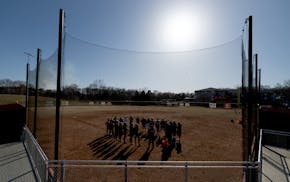PLAINVIEW, MINN. – Anthony McClellan couldn't sleep much the night before Sept. 14, eager to throw the first Pride celebration his small town has ever seen.
He was up at 5 a.m., in the bedroom of Annie Jurrens, his co-organizer for Plainview's Pride festival, by 6:30 a.m., as she was getting going to finish last-minute preparations. And he was on-site as security started to set up.
Not everyone was as excited as he was. In the days before the daylong celebration, residents had asked the police chief to cancel it. A Christian community group decided to hold a prayer circle in a park across town, praying that no evil come to the city of 3,500 people that day. And his and Jurrens' businesses got online threats shortly after they advertised Pride.
Big cities and small towns alike across Minnesota have struggled in recent years over LGBTQ issues, from drag shows and story hours to Pride flags and signs. For every organizer hoping to create space for underrepresented people, there are critics who question whether LGBTQ displays harm their community.
More small towns are starting their own Pride festivals — Grand Rapids and Plainview held their first events this year, while Albert Lea and Owatonna have a few years under their belts. As Pride events continue cropping up organizers and critics alike are faced with the same questions: What does it mean for small towns to embrace Pride? How can residents in those towns bridge the cultural divide to make everyone feel more accepted?
'The kind of place we want to live in'
About a half-hour northeast of Rochester, Plainview is a bedroom community for Mayo employees, though it also has two manufacturing companies in town that attract migrant workers.
Its downtown is less than a mile, bookended by the local high school and Hwy. 42, which cuts the town in half. Kitschy shops, variety stores, a martial arts studio fill the storefronts, close to a bowling alley and gas station.
Politically the area leans conservative. Local voters supported Donald Trump 3 to 2 in the 2020 presidential election, and the school district was one of two in Minnesota that didn't opt into the Minnesota Student Survey in 2022 over concerns about questions regarding gender.
That's part of the reason why McClellan has waited for years to put on a Pride celebration. He tried to about five years ago through a local theater group, but there was concern about the impact on the theater program.
There have been other issues, too. McClellan and Jurrens both remember the Confederate flag that used to hang near their businesses (Jurrens owns a store downtown), and the tizzy during the last school board election when one of the candidates had trans kids. More conservative candidates got elected.
A 33-year-old proud and bubbly gay man, McClellan grew up in Plainview and married his childhood friend only two years ago. Everybody knows and loves him, people say, but he's always felt people haven't truly accepted him or other LGBTQ+ residents in town.
"I told my husband when I married him, 'We either leave Plainview, or we make this town the kind of place we want to live in,'" McClellan said.
McClellan and Jurrens have been planning a Pride celebration for almost two years. They thought about a parade or an event in a park. But they worried about violence.
"There's so much vitriol being spewed about the trans community," Jurrens said. "These rights are under attack."
When McClellan opened his community rental space Atelier1901 earlier this year, they decided it was time.
Some welcomed the event, while others felt Jurrens and McClellan were being divisive and bringing in outsiders to bolster their own businesses. Very few were willing to be quoted about their opinions, fearing they would alienate potential customers or neighbors.
'My way of giving back'
More communities are struggling with the same conversations. There are 34 Pride events held in Minnesota, with another 12 along border towns in other states, according to Twin Cities Pride organizers. Plainview is among five new celebrations this year alone.
"It's a way for those small communities to see a reflection of themselves," said Andi Otto, director of Twin Cities Pride, which supports smaller celebrations through advice, supplies, or funds. Otto reached out to McClellan shortly after hearing about his safety concerns and offered to pay for security for the event.
Otto expects even more small towns to start Pride events over the next few years, as residents demand them.
"We're not going away and we're not going to be hidden," Otto said. "I don't foresee it slowing down any time soon."
LGBTQ folks in smaller towns say they need to be heard where they live, not just at celebrations in bigger cities.
"It's a conversation that needs to be happening," said Dylan Kaercher, an Austin resident who has built a following in southeast Minnesota with his drag persona Roxi Manacoochi, though he's had his own pushback for holding drag shows and story hours in his hometown.
Kaercher was in Plainview as one of four performers at the featured drag shows that evening, but he pulled double-duty hosting a story hour for kids, dressed as a quintessential 1950s housewife.
Roxi read three stories, all pre-approved by organizers. She sang songs and played games with the kids, all to celebrate differences and similarities among the people there. Roxi ended with Dolly Parton's book "Coat of Many Colors."
"When I thought about it, it was my way of giving back to a younger Dylan that would've really appreciated something like this," said Kaercher, who's openly gay. "If I would have been able to go to a drag queen story time, I think it would've helped me navigate growing up a lot easier."
Praying for others
As Roxi read stories to children, more than 60 people gathered under a shelter at Eastwood Park across town to pray.
They were called there by the Plainview Area Christians group, who organized the prayer circle in response to the drag shows. They preached for a peaceful day and wondered why the Pride organizers were so concerned about safety.
For over an hour, they prayed sitting on park benches or standing in the grass that no evil befall anyone in Plainview. They prayed together and in smaller groups for the children and for those who are confused to not to give in to evil but accept God. And they prayed for the media to report fairly on the town.
"The events that are taking place in town here need God's touch," said Tiffany Horton, one of the people who attended the prayer circle.
Horton said she doesn't believe Plainview's Pride event expresses the majority opinions or values of the community. She's concerned there's a concerted effort to push ideas that won't help onto people who are confused or struggling.
"We would make an effort, likewise, to pray for them and to bring God into their lives and help them with any struggles they have or decisions they're trying to make," she said.
'The start of something so magical'
Hundreds of people turned out for Plainview's Pride events, bringing tears to McClellan's eyes throughout the day. Roxi read to 100 or so people while others visited vendors inside Jurrens' shop. A local Methodist pastor gave "glitter blessings," drawing hearts with glitter paint on hands.
The two drag shows sold out the day before, bringing more than 140 adults to see performers from Austin and the Twin Cities. The shows themselves were bawdy parties filled with dancing, confetti, jokes and music.
But the Pride events in Plainview are just the beginning.
A group has started a local chapter of PFLAG, an education and advocacy group for LGBTQ rights. McClellan and Jurrens recently received a $50,000 University of Minnesota grant to host cultural events and conversations at Atelier1901, as well as help provide diversity and equity training for local teachers. And organizers are already working on next year's Pride event, vowing to hold it in a park and expand the celebration.
McClellan fired up the crowd at each show, thanking them for believing in his dream and for accepting him through good times and bad.
"This is the start of something so magical here," he said, choking up.

Golden Valley highway crash leaves one man dead; suspect in custody
Semi kills 10 cows on southeastern Minnesota highway
In South Carolina, Walz says Democrats 'need to change the attitude'
Two injured in shooting outside University of Minnesota arena after high school graduation

